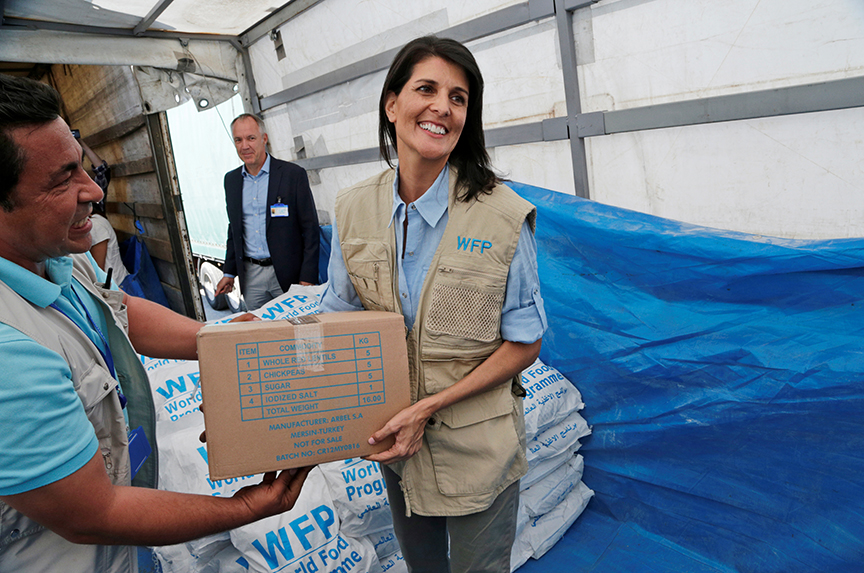 As US President Donald J. Trump prepares to head off for Memorial Day weekend, he should pause and reflect on the nature of war and reconsider his administration’s plans to gut American soft power. History tells us that support for overseas development initiatives and institutions like the United Nations is critical for promoting peace, security, and prosperity.
As US President Donald J. Trump prepares to head off for Memorial Day weekend, he should pause and reflect on the nature of war and reconsider his administration’s plans to gut American soft power. History tells us that support for overseas development initiatives and institutions like the United Nations is critical for promoting peace, security, and prosperity.
Last month marked one hundred years since the United States entered World War I which, in so doing, transformed the country’s place in the world. Woodrow Wilson’s momentous decision in April 1917 proved decisive both in military and geopolitical terms. By spurning the isolationist impulse that shaped American foreign policy since the nation’s founding, America’s entry into World War I was, in many respects, the first outing of a newborn superpower.
When it came to America’s role in the war—and in the world—opinions were as sharply divided in the early part of the 20th century as they are today. In The True Flag: Theodore Roosevelt, Mark Twain, and the Birth of American Empire, historian Stephen Kinzer canvasses the heated debate between those, like Twain, who argued for restraint, and interventionists like Roosevelt.
In some ways, Wilson himself started out an unlikely champion for military interventionism. Embracing a conventionally domestic platform at the outset, Wilson coined the phrase “America First” and successfully campaigned for re-election in 1916 with the slogan: “He kept us out of the war.”
But the horrors of war in Europe, the sinking of the British ocean liner Lusitania by a German submarine on May 7, 1915, and the revelation of the controversial Zimmerman Telegram in which Germany proposed an alliance with Mexico if the United States were to enter the war on the side of the Allies, provoked a change in public sentiment. Six months into his second term, Wilson took America to war telling Congress: “We shall fight for democracy.” The result? America’s intervention decisively shifted the odds in favor of the Allies and ended a bloody conflict that could have easily dragged on for years.
Today, policymakers and historians alike employ America’s entry into World War I as an example of a moment where interventionism was unavoidable. The global common good, in addition to national interest, demanded that America no longer remain on the sidelines.
But the real insight from America’s entry into World War I was not the precedent set by Wilson’s intervention itself, but rather the premise under which he did so. In Wilson’s “Fourteen Points” of peace, he outlined a plan for a new postwar order that would ensure a tragedy of such scale would never happen again.
Unfortunately for Wilson, and the world, the plan failed. America once again withdrew from the world. Without American support, less than a generation later a resurgent Germany, resentful of the punishing peace terms imposed on it after World War I, plunged the world into the abyss once again.
Only after World War II did American leaders fully embrace soft power, investing in development and diplomatic initiatives as much as defense. In contrast to the retribution paid out to the “losers” of World War I in the Treaty of Versailles, America’s commander in the Pacific, Gen. Douglas MacArthur, resisted calls to charge Japan’s emperor with war crimes. Instead he vowed to work with the emperor to rebuild Japan into a vibrant and thriving democracy. A similar effort was undertaken in war-torn Europe under the Marshall Plan.
As a result of these investments, the world has seen over seventy years of relative peace and stability that has benefitted America as much as any other country. Japan is now one of America’s closest trading partners and has long been the second-biggest contributor to the United Nations’ budget supporting peacekeeping and humanitarian efforts. Similarly, America’s $180 billion investment—in today’s dollars adjusted for inflation—in the postwar reconstruction of Europe has been repaid multiple times over with the US exporting $250 billion worth of goods to Europe annually.
Today, America’s contribution to the UN and development assistance efforts are seen by many military and defense leaders as a core pillar of an effective national security policy. Although great power conflict might be seen as a remote prospect these days, the threat posed by failed states remains very real. In an op-ed in The Washington Post in April, former US President George W. Bush outlined the “practical purpose… lifesaving aid” has for Americans when it alleviates the suffering of people “mired in disease” and “left ripe for recruitment by extremists.”
The Trump administration’s proposal to slash funding for the UN and aid efforts is not only out of step with recent history, but also undermines its ability to help countries like Syria rebuild in the long term. As a result, America and the world will be much less safe. As we remember the courage and sacrifice of American soldiers this Memorial Day weekend, it’s timely to recall the financial investments it took to promote peace and prosperity.
Michael Sheldrick is the global director of policy and advocacy for Global Citizen. You can follow him on Twitter @micksheldrick.
Image: US Ambassador to the United Nations Nikki Haley held a World Food Programme food parcel, part of a humanitarian aid shipment to Syria, during a visit at a border gate with Syria in the Turkish border town of Reyhanli in the southern Hatay province on May 24. (Reuters/Burhan Ozbilici)
